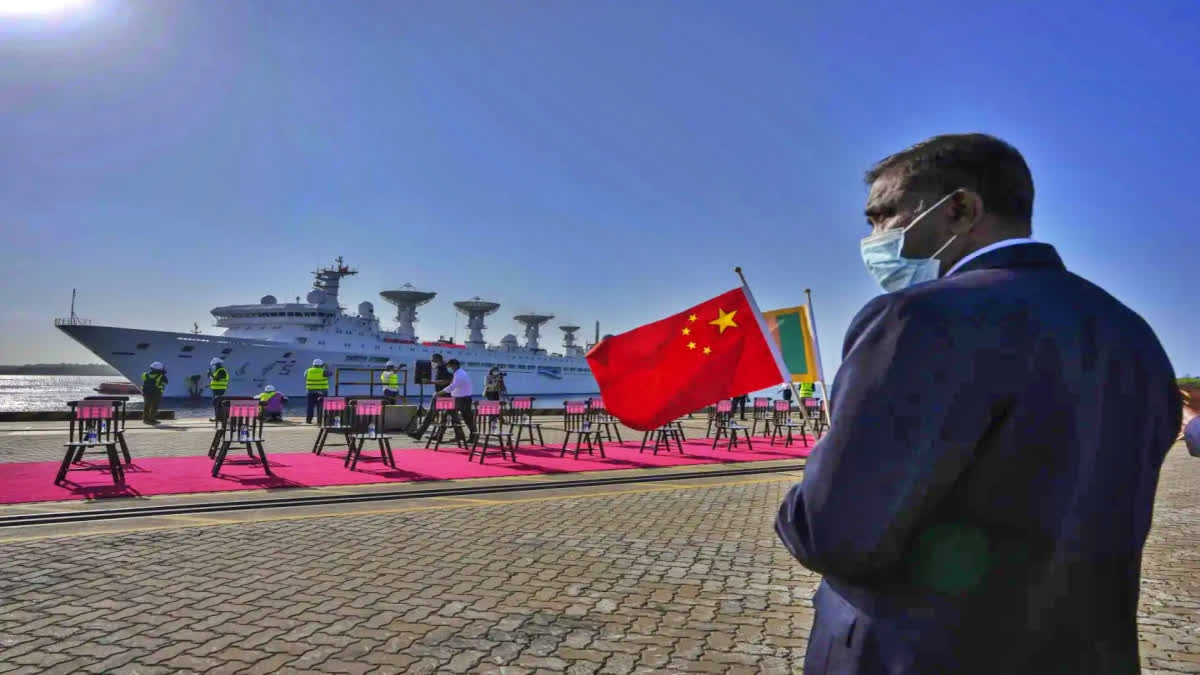New Delhi: Despite Sri Lankan President Ranil Wickremesinghe assuaging India’s apprehensions about the presence of Chinese naval ships in his island nation’s waters during his visit to New Delhi last month, a Chinese warship made a port of call in Colombo earlier this week.
Asked about this during his weekly media briefing on Friday, External Affairs Ministry spokesperson Arindam Bagchi said that he had reports in this connection but he was “not sure whether it is a warship or not”. “I will only say that having seen these reports, I would emphasize the government carefully monitors any development having a bearing on India's security interests and takes all necessary measures to defend them,” Bagchi added.
But the fact of the matter is that it was indeed a warship. According to the Daily Mirror newspaper, the Hao Yang 24 Hao made a formal port of call at Colombo port on Thursday. The report, citing informed sources, said that the warship had docked for replenishment and was scheduled to depart the next day. The 129-metre-long ship is manned by a crew of 138 and is commanded by Commander Jin Xin.
Last year too, India had strongly protested when a Chinese survey vessel called the Yuan Wang 5 was allowed to dock at the Hambantota port in Sri Lanka. Though the ship was described as a research and survey vessel, security analysts said that it was also packed with space and satellite tracking electronics that can monitor rocket and missile launches. The ship was given permission to dock by then President Gotabaya Rajapaksa a day before he fled the country in the midst of an economic crisis.
Also read: India hands over INR 450 million to Sri Lanka to fund its digital identity project
During his visit to New Delhi, Wickremesinghe said that his country has adopted a new standard operating procedure (SOP) to determine what kind of military and non-military ships and aircraft will be allowed to visit the country. The SOP was adopted following a request by India but its details are not available in the public domain yet. The US too has been pressurizing Sri Lanka not to allow Chinese naval ships in its waters due to security and strategic considerations.
Though Wickremesinghe claims that his country maintains an Asia-centric neutral foreign policy without getting involved in any major power, Colombo is compelled to maintain equally good relations with both New Delhi and Beijing due to external debt obligations and the economic crisis last year.
“It is difficult for Sri Lanka to say no to China,” Anand Kumar, Associate Fellow in the Manohar Parrikar Institute of Defence Studies and Analyses, told ETV Bharat. “China has made large investments in Sri Lanka. Sri Lanka owes a lot of debt to China and Beijing is exploiting that.”
Kumar cited the Hambantota port as an example. He said that despite India pointing out to Sri Lanka that it will fall into a debt trap, then President Mahinda Rajapaksa went ahead and took Chinese loans for the construction of the Hambantota port in the hope of developing his constituency. But the whole project was economically not viable.
Construction of the port started in January 2008. In 2016, it reported an operating profit of $1.81 million but was considered economically unviable. As debt repayment got difficult, the government decided to privatize an 80 per cent stake in the port to raise foreign exchange in order to repay maturing sovereign bonds unrelated to the port.
Of the two bidding companies, China Merchants Port was chosen, which was to pay $1.12 billion to Sri Lanka and spend additional amounts to develop the port into full operation. In July 2017, the agreement was signed, but China Merchants Port was allowed a 70 per cent stake. Simultaneously a 99-year lease on the port was granted to China Merchants Port.
“Chinese ships visiting Sri Lanka change the security situation in the Indian Ocean region greatly,” Kumar said. “No matter what the SOP (of Sri Lanka) is, the coming of Chinese military ships and submarines in India’s neighbourhood is a matter of concern.”
India is also part of a Quad comprising the US, Japan and Australia which is working for a free and open Indo-Pacific in the face of China’s hegemony in the region. That is why security in the Indian Ocean region has huge strategic implications. Not only for India, what Colombo does in terms of foreign policy and developments in Sri Lanka have wider implications for other major powers’ access to the Indian Ocean.



